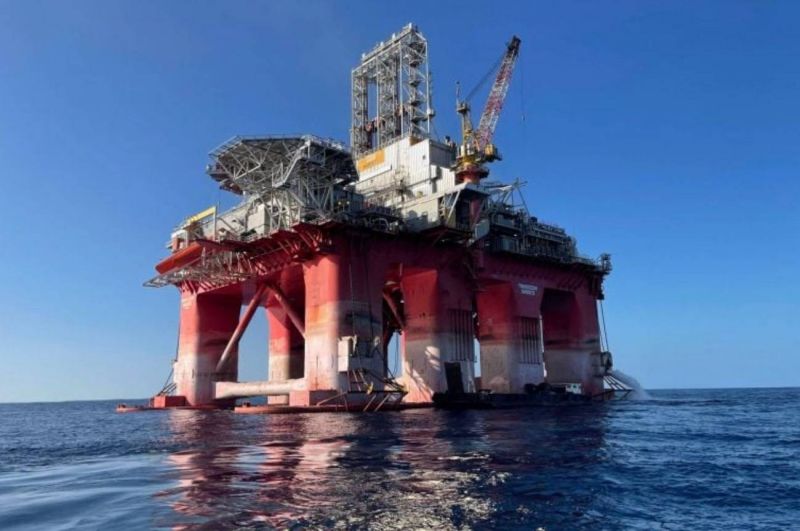
The Transocean Barents drilling platform installed in Lebanese territorial waters in search of offshore gas. (Credit: TotalEnergies/AFP Archives)
It is neither halted nor suspended. This was the response of the Lebanese Energy and Water Resources Ministry concerning gas exploration in offshore Block 9, south of the Lebanese Exclusive Economic Zone (EEZ). Regardless, the development of Block 9 faces suspension after the outbreak of war Saturday between Hamas and Israel and amidst renewed tensions on Lebanon’s southern border.
The exploration operation of the oil field is being carried out by a consortium led by France’s TotalEnergies includes Italian oil giant ENI and state-owned QatarEnergy. It is working to confirm the presence of gas sufficient for extraction.The consortium stated that its work on Block 9 will continue “normally for the time being,” according to the ministry. When contacted, TotalEnergies refused to comment.
On Monday, Israel’s Energy Ministry asked Chevron, which operates the offshore Tamar gas field, to stop gas production. The Tamar field, located 25 kilometers off the shore of Ashkelon, can be seen from the north of the Gaza Strip on a clear day and could be within range of potential rocket fire.
On the Lebanese side
“It is still early to determine the impact that the conflict will have on Lebanese offshore activities. We are in the first phase of hostilities and we don’t know how the conflict will evolve,” said Mona Sukkarieh, energy and political risk consultant and co-founder of Middle East Strategic Perspectives.
Diana Al Kayssi, an energy governance expert and member of the Lebanese Oil and Gas Initiative (LOGI), agrees. Although the atmosphere is tense on Lebanon’s southern border, “for the moment business is seemingly as usual in terms of the operation of the platform,” said Kayssi.
This is the first time Lebanon fears for its offshore exploration activities. “War calculations must now take into account the exploration in territorial waters,” Kayssi said. She explained that the consortium has already taken this into account by including a “force majeure” clause in its contract, in case it needs to halt all activity.
The possible suspension of exploration would not immediately result in direct and substantial monetary losses for Lebanon, given that no oil and gas resources have yet been found. However, if activity is suspended, it would further delay the process and call into question the contracts awarded for blocks 8 and 10.
On the Israeli side
“In the wake of the situation, Israel’s defense establishment ordered the temporary suspension of natural gas supplies from the Tamar field,” stated the Israeli Energy Ministry.
“For the time being, it is not known how long the conflict will last or when the platform will be brought back into service. On the other hand, no shortages are expected on the Israeli side,” said Sukkarieh. “This is not the first time that activity on the Tamar platform has been suspended. This was already the case in May 2019 and May 2021 due to hostilities [between Gaza and Israel].”
The Tamar gas field provides Israel with 70 percent of its electricity needs, according to Chevron. The Israeli Ministry of Energy stated that it is preparing to use alternative fuels to power its stations. Chevron also said that operation at Israel’s largest offshore gas field, Leviathan, are continuing normally.
Regional disruption
In a separate statement, the Israeli Energy Ministry said Prime Minister Benjamin Netanyahu’s government authorized Energy Minister Yisrael Katz to declare a state of emergency in the energy sector for the next two weeks, if necessary. The measure would enable the Israeli cabinet to supply natural gas to consumers in the event of a supply shortage.
On the other hand, activity suspension on the Tamar field is likely to disrupt regional supplies. Since production at the Tamar field began 10 years ago, Israel has become a major regional supplier of gas. According to Sukkarieh, in 2022 10.25 billion cubic meters of natural gas was extracted from the Tamar field, around 47 percent of local production, of which 1.56 billion was exported to Jordan and Egypt.
This article was originally published in French in L'Orient Le-Jour. Translation by Joelle El Khoury.